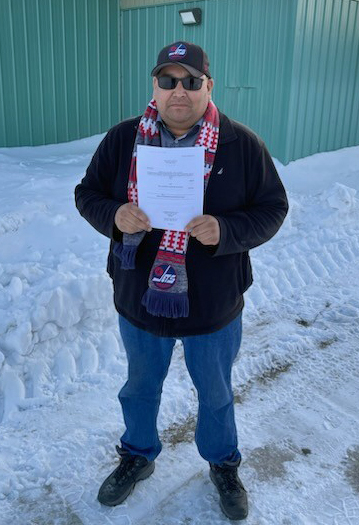Roseau River First Nation man leads lawsuit against Ottawa
Advertisement
Hey there, time traveller!
This article was published 22/02/2023 (982 days ago), so information in it may no longer be current.
A man from Roseau River First Nation is acting as lead plaintiff in an $11-billion lawsuit against the federal government launched by seven Manitoba First Nations over the issue of annuity payments.
Zongidaya Nelson says the annual sum provided to status members of the seven First Nations that signed Treaty 1 with the Crown in 1871—Roseau River, Brokenhead, Sandy Bay, Peguis, Fort Alexander, Long Plain, and Swan Lake—should have increased in step with inflation over the last 150 years.
The 37-page lawsuit, which seeks to recoup 150 years of missed inflationary increases, with damages and interest, began as a class action in 2019. It was restructured and refiled last fall in the Manitoba Court of King’s Bench with Nelson as lead plaintiff. New legal documents were filed last week. In a news conference and subsequent interview, Nelson explained his role in the lawsuit and what he is hoping to achieve.

“I’ve been pushing the lawyers to do press for the last year, because it’s an important issue for everybody,” he said. “It would be good if we could have the people of Treaty 1 all pushing the same way.”
Nelson, a former elected councillor who now works in child and family services, said he’s well-positioned to act as lead plaintiff because he is detached from the political ebb and flow of election cycles.
Nelson explained previous attempts to advance the lawsuit have stalled when new councils are elected and priorities change.
“I’m not an elected official so I’m not bound by an election that I have to worry about,” he said.
Annuity payments are an individual right under Treaty 1. They have remained at $5 per person since 1875. The lawsuit argues annuity payment amounts should have increased along with the price of common goods referenced in the treaty, such as blankets, clothing, and traps.
The lawsuit argues the treaty’s language around “the current market price of goods” implies annuity payments should be tied to inflation.
By keeping annuity payments static, the lawsuit argues, the Crown acted in bad faith and breached its obligations to the seven First Nations. As a result, the value of the annuity payments was diluted over time by “the erosive power of inflation.”
Nelson said when he lived in Winnipeg, he would let his annuity payments accrue until they surpassed the cost of the fuel needed to collect them from the reserve, located near Dominion City.
“Otherwise, you’re going to spend $30 in gas just to come down for $5,” he said.
Any settlement arising from the lawsuit would be divided among the 38,000 status members of the seven First Nations, including the 2,728 status members of Roseau River, said Jason Zushman, a lawyer representing the plaintiffs.
Zushman declined to say what the dollar value of an annuity payment should be in today’s dollars, explaining a specific figure at this stage could prejudice a future court settlement. But he underscored the cumulative effect of being shortchanged for generations.
“It’s a grossly disparate amount of purchasing power that occurs, not only in present day, but think of the historical impact of that echoed throughout time,” Zushman said.
Nelson said modernizing annuity payments is an important way the government can advance reconciliation efforts with First Nations.
“We were left without the ability to access finances, goods, and tools which would foster our equal participation in a foreign economy which the Crown forced upon us,” he said. “Reconciliation requires the Crown to act fairly and honourably in its dealings with First Nations people.”
Nelson said Roseau River members could use the proceeds from a settlement to improve their quality of life by building a house or starting a business.
The federal government has yet to file a statement of defence in the lawsuit.
In a written statement, Megan MacLean, a spokesperson for Crown-Indigenous Relations and Northern Affairs Canada, acknowledged receipt of the revised lawsuit and said lawyers are currently reviewing it to determine next steps.
“The litigation is still active, therefore, it would not be appropriate to comment further,” she added.
MacLean said honouring treaty relationships and working with First Nations is important to Ottawa.
“We recognize that more needs to be done with regard to renewing the Treaty relationship and remain open to looking at ways to advance this important work,” she said.
Zushman said he is “intrigued” by that part of the department’s response.
“There appears to be appetite towards reconciliation and true reform, and an acknowledgement that…honouring of the treaty relationship and working together is key to advancing lasting reconciliation,” he said.
In addition to appealing to the text of Treaty 1, the lawsuit cites the United Nations Declaration on the Rights of Indigenous Peoples and the Truth and Reconciliation Commission’s calls to action. It also references an ongoing Ontario lawsuit regarding annuity payments for treaty members in northern regions there.
Zushman couldn’t provide a timeline for the lawsuit’s resolution, explaining discussions with the federal government’s lawyers are ongoing. He said progress could happen around the negotiation table or in a courtroom.
Nelson said he has no plans to travel to Ottawa or request a meeting with Crown-Indigenous Relations Minister Marc Miller, whose office did not return a request for comment.
With a potentially years-long legal battle ahead, encompassing 150 years of fraught history between government and First Nations, Nelson was asked what a win would look like.
“In this case, it’s recognition that they failed to provide the necessary services that they’re supposed to,” he said.
